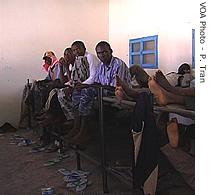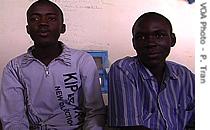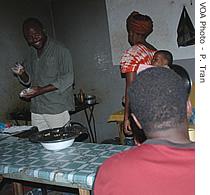2007年VOA标准英语-Clandestine Migration Changes in Mauritanian Hu(在线收听)
Nouadhibou, Mauritania
03 August 2007
Sub-Saharan Africans have been leaving the continent to work overseas since the early 1900s. Many have sought, and found work in Europe. But countries that accepted cheap labor in the past are now turning away migrant workers as they face their own employment problems. That has not stopped some Africans desperate to make a living from trying to get to Europe. But it has made their journey more dangerous. Phuong Tran spoke with some illegal migrants in the West African coastal fishing town of Nouadhibou, Mauritania.
Nouadhibou is one of the closest African ports to Spain and has turned into a hub for would-be migrants
Local officials say more strict surveillance is cutting down the numbers trying to leave illegally for Europe.
 |
| Youth in a migrant detention center in Nouadhibou |
Mo Diallo is a 17-year-old from Mali. He says he is very tired. Diallo says the boat was at sea for three days when the motor died.
Diallo says when the young men arrived at the center, the Spanish Red Cross let each person make a five-minute phone call to let someone know they were alive.
Diallo adds he was scared of dying at sea, but knew God would protect him.
Next to him, 14-year-old Tamba Krin says he left behind his sister and everything else. He says there is no work for his family in Mali, so he had to leave.
 |
| Malian migrants Mo Diallo and Tamba Krin |
According to Mauritania's Interior Ministry, the national police prevented more than 11,000 migrants from continuing their journey to Europe in 2006. This year, it says some 4,500 migrants have been intercepted with the help of the Spanish government, which has provided a boat and plane with night radar equipment.
But Ahmed Kleib, president of APEAH, a Nouadhibou non-profit organization that has worked with migrants without visas since 2000, says the drop in numbers is only temporary.
Kleib says the youth are committed to leave secretly. Kleib says surveillance cannot solve the problem. He says his center sees youth who are caught and sent home, only to return within the week.
The West Africa Representative of the U.N. Office on Drugs and Crime, Antonio Mazzitelli, says African organized crime, which runs the escape boats, is changing its routes to avoid police. Mazzitelli says boats now go out further from the Mauritanian coast.
Also he adds, boat operators can buy their way out of getting caught.
"Corruption all over West Africa is a big problem because people who are not well paid, who are not well motivated easily might accept money in exchange for closing their eyes," said Mazzitelli.
But Nouadhibou's Governor Mohamed Yahya, who oversees the town's police and gendarmes, says his forces are fully cooperating with international partners to stop illegal migration.
The U.N.'s Mazzitelli says organized, well-financed criminals compound the problem.
"There has been the entrance of a new freelancer, or people who have been brought into the business mobilizing or recruiting migrants," he said. "Like in any other business, once that there is an item that sells, then there are people who are ready to sell and promote it."
 |
| Guinean migrant Lansana inside a Nouadhiboun food shack |
Lansana says he is trying to leave again, this time for free. He says if he can find four paying clients, the boat organizer will let him go for free.
When asked if he is afraid of another boat accident, he shrugs and replies: "If you do not risk anything, you cannot gain anything." He says he does not see another way to get to Europe, and besides, he adds, "We all have to die in the end anyway."